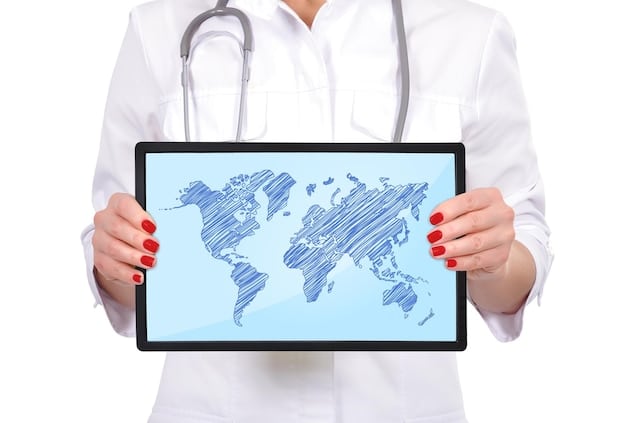Stay Informed: Reliable Sources During a Health Crisis

Staying informed during a public health crisis requires accessing information from reliable sources and utilizing effective communication channels to make informed decisions and protect yourself and your community.
In times of public health crises, the ability to access and understand accurate information is more critical than ever. Knowing how to stay informed during a public health crisis: reliable sources and information channels can empower you to make the right decisions for yourself, your family, and your community. This article will guide you through navigating the information landscape and identifying trustworthy resources, ensuring you remain well-informed and prepared.
Understanding the Importance of Reliable Information
During a public health crisis, misinformation can spread rapidly, causing unnecessary panic and confusion. This makes it crucial to prioritize accurate, reliable information from trustworthy sources. Understanding why this matters can help you filter through the noise and focus on what’s essential to protect your health and well-being.
The Dangers of Misinformation
Misinformation can have severe consequences during a health crisis. False claims about treatments, preventative measures, or the severity of the situation can lead to people making harmful decisions. Social media platforms can inadvertently amplify these inaccuracies unless you know how to properly vet sources. It’s important to understand the potential effects of misinformation so you can act responsibly and skeptically.
Why Trustworthy Sources Matter
Trustworthy sources adhere to strict standards of accuracy and transparency. Organizations like the Centers for Disease Control and Prevention (CDC) and the World Health Organization (WHO) provide data-driven recommendations and updated information based on the latest scientific research. Knowing these sources can give you peace of mind knowing you’re accessing credible information. It’s crucial, for example, to understand the key differences between initial reports and peer-reviewed studies.
- Verify the source’s credentials and reputation.
- Cross-reference information with multiple credible sources.
- Be cautious of sensational headlines or emotionally charged content.
In summary, the importance of relying on trustworthy sources cannot be overstated during a public health crisis. By understanding the dangers of misinformation and seeking out credible sources, you can make informed decisions that protect your health and the health of those around you.
Key Sources of Information: Government and Health Organizations
When seeking information during a public health crisis, government and health organizations are primary resources you should prioritize. These entities are dedicated to providing accurate, up-to-date information to protect public health. This knowledge can guide you to the right sources when time is of the essence.
Centers for Disease Control and Prevention (CDC)
The CDC is a leading national public health institute in the United States. It offers comprehensive guides, data, and recommendations during health crises. The CDC website is regularly updated with the latest information on disease outbreaks, prevention strategies, and travel advisories.
World Health Organization (WHO)
The WHO is an international agency focused on global health issues. It provides guidance, research, and recommendations during global health emergencies such as pandemics. As a leader in international health, the WHO monitors global health risks and ensures reliable information is available to everyone.
- Check for the latest updates and press releases on their websites.
- Follow their social media channels for real-time information.
- Consult their guidance on prevention, symptoms, and treatment.
In conclusion, government and health organizations like the CDC and WHO are invaluable resources for staying informed during a public health crisis. By utilizing these sources, individuals can be confident they are receiving the most accurate and timely information available.

Utilizing News Media Responsibly
News media plays a crucial role in disseminating information during a public health crisis. However, it’s essential to consume news responsibly to avoid misinformation and sensationalism. Knowing how news sources operate helps you filter useful information from distraction.
Choosing Reputable News Outlets
Stick to well-known and respected news organizations with a track record of accurate reporting. These outlets often have established standards for fact-checking and editorial oversight. Look for news providers that are committed to journalism integrity.
Being Aware of Sensationalism and Bias
Be cautious of news stories that exaggerate or dramatize the situation, as this can lead to unnecessary panic. Also, consider the potential biases of the news source and seek out multiple perspectives. Watch for news that’s designed to elicit an emotional response rather than present facts.
- Verify information from news sources with official health organizations.
- Read multiple news sources to gain a well-rounded understanding.
- Be cautious of headlines that seem exaggerated or unrealistic.
Ultimately, utilizing news media responsibly during a public health crisis involves critical thinking and discernment. By choosing reputable outlets and being aware of potential biases, individuals can stay informed without succumbing to sensationalism or misinformation.
The Role of Social Media and Online Platforms
Social media and online platforms have become key sources of information, but they also pose unique challenges during a public health crisis. It’s crucial to approach these platforms with caution and adopt strategies for verifying information. Awareness is the first step to making these useful tools.
Identifying Misinformation on Social Media
Social media can be a breeding ground for misinformation, so it’s important to critically evaluate posts and shares. Look for red flags such as lack of sources, sensational headlines, and emotionally charged language. Consider that almost anyone can post information on these platforms. Double-check the source’s credibility before accepting information as truth.
Leveraging Social Media for Official Updates
Despite the risks, social media can be used to access official updates from government agencies and health organizations. Follow verified accounts of the CDC, WHO, and your local health department to receive timely and accurate information. Use social media actively but with caution, always seeking confirmation from official sources.
- Follow only verified accounts for official information.
- Be skeptical of unverified claims and shares.
- Cross-reference information from multiple credible sources.
In conclusion, social media and online platforms can be valuable tools during a public health crisis, but they must be approached with caution. By being vigilant and discerning about the information you consume, you can leverage these platforms for good while avoiding misinformation.
Practical Steps for Verifying Information
Verifying information is a crucial skill to develop during a public health crisis. By taking a few simple steps to check the accuracy and reliability of information, you can make more informed decisions and avoid being misled. Start by being aware of your own biases.
Checking Sources and Credentials
Always check the source of the information and evaluate its credentials. Determine if the source is a recognized expert or reputable organization in the field. Look for any potential conflicts of interest that might bias the information.
Cross-Referencing with Multiple Sources
Do not rely on a single source, no matter how trustworthy it may seem. Cross-reference information with multiple credible sources to confirm its accuracy. Look for consistency among different sources to ensure reliability.

Using Fact-Checking Websites
Fact-checking websites such as Snopes and PolitiFact are valuable resources for debunking false claims and verifying information. These sites provide unbiased assessments of the accuracy of statements and claims made in the news and on social media. Always be ready to adjust your perception once new information is verified by a fact-checking agency.
- Examine the source’s “About Us” page for credentials and mission.
- Look for evidence-based data and scientific studies.
- Use fact-checking sites to verify claims and reports.
Verifying information is an essential tool for staying informed and making sound decisions during a public health crisis. By taking practical steps to check sources, cross-reference information, and use fact-checking websites, you can ensure that you are relying on accurate and trustworthy information.
Protecting Yourself from Information Overload
During a public health crisis, the constant barrage of information can be overwhelming. Protecting yourself from information overload is essential for maintaining your mental and emotional well-being. It also allows you to focus on the most relevant and actionable insights.
Setting Boundaries for News Consumption
Establish specific times and durations for checking the news to prevent it from consuming your entire day. Avoid constantly refreshing news sites or scrolling through social media feeds. Set boundaries for accessing information to maintain a healthy balance. Schedule specific times to engage with news and information to maintain control.
Focusing on Actionable Information
Prioritize gathering information that empowers you to take specific actions to protect your health. Focus on guidance from health authorities, preventive measures you can implement, and resources available in your community. Seek knowledge that is immediately useful and relevant to your situation.
- Limit news updates to certain times of the day.
- Turn off notifications for news apps and social media.
- Focus on actionable steps you can take to protect yourself.
In conclusion, protecting yourself from information overload is an important aspect of staying informed during a public health crisis. By setting boundaries for news consumption and focusing on actionable information, you can maintain your well-being and make informed decisions without feeling overwhelmed.
| Key Point | Brief Description |
|---|---|
| ✅ Reliable Sources | Use official health organizations and reputable news. |
| 📱 Social Media Caution | Verify information before sharing. Follow trusted accounts only. |
| 🔎 Fact-Checking | Use fact-checking websites to verify claims. |
| ⏰ Limit Consumption | Set boundaries for news intake to prevent overload. |
Frequently Asked Questions (FAQ)
▼
Verifying information is crucial because misinformation can lead to harmful decisions, panic, and distrust. Accurate information empowers you to protect your health.
▼
Reliable sources include the CDC, WHO, government health agencies, and reputable news outlets with strict fact-checking standards. These sources offer validated data.
▼
Follow verified accounts, be skeptical of unverified claims, cross-reference information, and use fact-checking websites to verify information before sharing it with your network.
▼
Set specific times for checking the news, turn off notifications, and focus on actionable information that helps you protect yourself. This improves your mental health.
▼
Prioritize information from official health organizations like the CDC and WHO. Look for a consensus among multiple credible sources before making any important decisions.
Conclusion
Staying informed during a public health crisis requires a discerning approach to information consumption. By prioritizing reliable sources, verifying information, and protecting yourself from overload, you can navigate any situation with knowledge and confidence.





